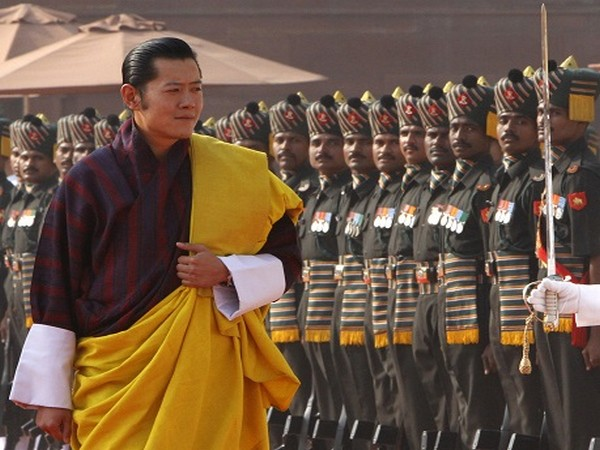Gelephu Mindfulness City's vision holds potential to bolster Bhutan-India relations
Bhutan's King Jigme Khesar Namgyel Wangchuck unveiled an ambitious vision for Gelephu Mindfulness City that holds promising potential to significantly bolster Bhutan-India relations, as reported by The Bhutan Live.

- Country:
- Bhutan
Bhutan's King Jigme Khesar Namgyel Wangchuck unveiled an ambitious vision for Gelephu Mindfulness City that holds promising potential to significantly bolster Bhutan-India relations, as reported by The Bhutan Live. On December 17, Bhutan celebrated its 116th National Day, and in a historic announcement, the Bhutan King unveiled an ambitious vision that could redefine the country's economic landscape.
The centrepiece of this vision is the Gelephu Mindfulness City Special Administrative Region (SAR), set to emerge as a pivotal economic hub in South Asia. Moreover, as a proposed economic corridor linking South Asia with Southeast Asia, it aligns with India's aspirations for regional connectivity, according to The Bhutan Live.
Reportedly, the project's vision of mindful, sustainable development resonates with Bhutan's cultural identity and Gross National Happiness philosophy. Meanwhile, it also attracts Indian investment and expertise in areas like infrastructure and renewable energy.
Furthermore, the increase in trade and collaboration would further cultivate mutual understanding and goodwill, cementing the long-standing partnership between the two nations, The Bhutan Live reported. Gelephu's emphasis on cultural exchange and spiritual values offers a unique platform for strengthening shared historical and spiritual ties, paving the way for a deeper, multifaceted relationship beyond traditional economic and political bonds.
Bhutan King Wangchuck's blueprint for Gelephu involved strategic investments in green energy, robust infrastructure, and comprehensive education systems. The project aimed to seamlessly blend modernity with ancient architecture while staying rooted in mindfulness and Buddhist principles, further distinguishing it from conventional megacities.
The Gelephu cities are packed with optimism as they envisioned the city's transformation through the SAR plan. One of the residents, Dhan Kumari Subba, saw the SAR as a beacon of hope, not just for the present but for future generations. The meticulously designed city promises essential amenities and a nurturing environment for the coming years.
Lopen Thukten Jamtsho from Zhung Dratshang noted the distinctive nature of Gelephu's SAR and emphasised its blend of modern and ancient architecture, grounded in mindfulness and Buddhist values. The city's unique character is set to attract attention not only as an economic powerhouse but also as a cultural and spiritual centre, as reported by The Bhutan Live.
Meanwhile, a private entrepreneur Lobzang Dorji viewed SAR as more than an economic opportunity, adding that it is a catalyst for innovation and growth. According to him, Gelephu's well-planned urban centre will open new horizons for businesses, fostering entrepreneurship and contributing to a dynamic and prosperous future.
Yeshi Zimba from Wangdue Dzongkhag anticipated the SAR plan to spur economic growth, attracting businesses and talent due to improved infrastructure and enhanced quality of life. She further envisioned a diverse population creating a vibrant and cosmopolitan atmosphere.
Civil servant Karma Choden saw the SAR initiative as a promise for a more efficient and organized urban landscape, fostering sustainable development and enhancing residents' quality of life. Additionally, Kinga Lhamo from Dagana Dzongkhag raised these sentiments and stressed the potential for self-sufficiency and increased employment opportunities, reported The Bhutan Live.
The SAR plan's potential to address unemployment resonates with many, including Sangay Wangmo, who saw it as a pivotal force in revitalizing the country's economy. Sonam Lhaden, Deputy Chief Environment Officer under the Climate Change Division of the National Environment Commission Secretariat (NECS), hoped that the SAR would not only generate employment opportunities but also retain talented youth within the country, further contributing to its growth.
Meanwhile, the SAR's significant geographical coverage of 1,000 sq. km or 250,000 acres highlighted its potential as a catalyst for economic activity and investment, despite constituting only 2.5 per cent of the country's total surface area, according to The Bhutan Live. Wangchuck further stressed that the Mindfulness City is designed for the benefit of Bhutanese citizens, both within the country and abroad, that will offer gainful employment opportunities and encourage those abroad to return.
Reportedly, Gelephu Mindfulness City SAR is poised to become the heart of an economic corridor connecting two billion people in South Asia and Southeast Asia. Moreover, with administrative privileges and a focus on sustainability, technology, and finance, the SAR will also attract businesses aligned with Bhutan's unique culture and Buddhist values, prioritizing spiritual well-being alongside economic prosperity. (ANI)
(This story has not been edited by Devdiscourse staff and is auto-generated from a syndicated feed.)
- READ MORE ON:
- Southeast Asia
- 116th National Day
- Gelephu Mindfulness City
- Buddhist
- Gross National Happiness
- The Bhutan Live
- Zhung Dratshang
- Southeast Asia
- Indian
- Gelephu
- Sangay Wangmo
- Wangdue Dzongkhag
- Sonam Lhaden
- Climate Change Division
- Gelephu Mindfulness City's
- Kinga Lhamo
- Bhutan King Wangchuck's
- South Asia
- India
- Lobzang Dorji










